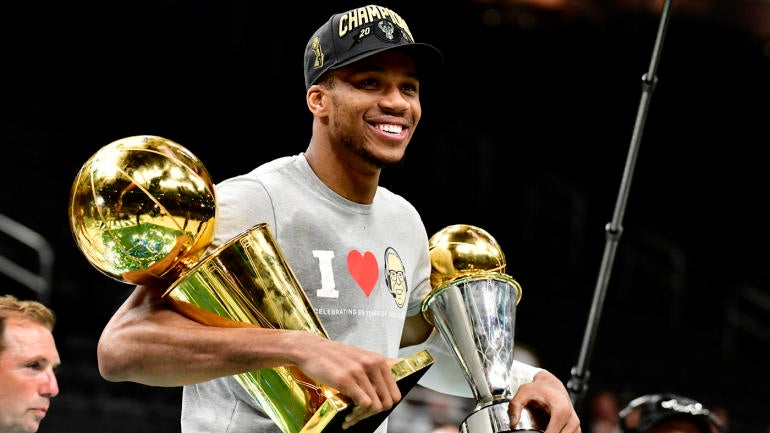
Giannis Antetokounmpo was all the way at the end of the bench, dead silent, his Milwaukee Bucks on the wrong end of a brutal blowout. The loss burned him, but all he could do is pledge to be better, to do whatever it takes to bring the franchise a championship.
It was a bit dramatic for a summer league game. For Antetokounmpo, though, the 100-71 loss to the San Antonio Spurs wasn't just any summer league game. It was his last chance to get a win in a Bucks uniform before jetting off to play for Greece's national team. He was 20 years old, coming off a rookie season in which Milwaukee had gone 15-67, the worst record in the NBA. He had not planned to leave Las Vegas without a single victory.
Antetokounmpo lamented to reporters that he hadn't won a game in months, then took to Twitter: "I'll never leave the team and the city of Milwaukee till we build the team to a championship level team," he wrote.
The follow-up: "It needs a lot of work but me and the guys we are ready to take the challenge.. #HateLoosing #BecomingAleader."
Seven years and five days later, Antetokounmpo, long the Bucks' leader, became a champion. It was a performance for the ages: 50 points, 14 rebounds, five blocks and shooting so accurate that it bordered on spooky, as if he had tapped into some cosmic resource only available to all-time greats when they absolutely need it. Antetokounmpo shot 16 for 25 in Game 6 on Tuesday, and he made 17 of his 19 free-throw attempts.
Most of Antetokounmpo's buckets were at the rim, as usual. But when the Bucks' offense had little else going on, Antetokounmpo scrounged up some points on contested jumpers in between the foul line and the restricted area. He made an I-dare-you-to-take it 3-pointer to make it a one-point game early in the third quarter. He made a push shot from about 14 feet to put the Bucks up by eight in crunch time.
These were shots that the Phoenix Suns were willing to live with. These were shots that, throughout Antetokounmpo's career, have been described as "scary" because of what they might mean for his future. Only a truly extraordinary player could win back-to-back MVPs without making them consistently. To win Finals MVP, he didn't hunt those shots, but, when he couldn't get anything better, he took them fearlessly.
If Antetokounmpo personifies this championship team, it is because of this steadfast belief in himself. A skinny teenager the day he arrived in Milwaukee, he couldn't get a shot off in a game of one-on-one against John Henson. When his parents joined him during the season, he pointed at the retired jerseys in the rafters of the arena and told them he hoped his No. 34 would be up there with Kareem Abdul-Jabbar's No. 33 and Oscar Robertson's No. 1.
As a rookie, Antetokounmpo wore a wristband with the phrase "continuous improvement" on it. Teammates worried he was too hard on himself.
"He was so competitive," ex-Bucks assistant coach Nick Van Exel recalled years later. "He hated having bad games. He hated to leave the gym. I don't know if it was because he didn't like his apartment or what it was, but he just didn't want to go back. He would stay in the gym, and I'm telling you, just run around. Just like a little kid. He was like a little kid, but he was focused on getting better. He was focused on improving his game."
Months after signing a $100 million contract at the age of 21, the reigning Most Improved Player told Sports Illustrated that he'd punish himself for bad games by literally recreating his mistakes on the Bucks' practice court, driving there straight from the arena and sometimes staying as late as 3 a.m. He was starting at point guard at the time, trying to be more vocal on the court and figuring out how to put an entire franchise on his shoulders. Two years later, after losing four straight games in the 2019 conference finals, he thanked the Toronto Raptors' Kawhi Leonard and Marc Gasol for stifling him.
"I'm not trying to be sarcastic," Antetokounmpo told The Athletic. "I'm being honest. They're going to push me to be better."
Down 1-0 to the Atlanta Hawks in the conference finals last month, at shootaround Antetokounmpo laughed about his difficulties at the free-throw line. Rather than beating himself up, he wore his airballed free throws in Game 7 of the previous series as badges of honor. "Doesn't matter," he announced. "I came back!"
The end of every season inspires weighty proclamations about what the result means and how other teams might try to emulate the champions. In a broad sense, the Bucks are a testament to owning your failures, learning from losses and sticking with it. Nothing Milwaukee did, though, would have been possible without the singular talent and singular personality of Antetokounmpo. Eight years ago, the Bucks drafted a prospect with limitless potential out of the Greek second division, and that prospect has held himself to a preposterously high standard.
Antetokounmpo said Tuesday that he had signed his five-year contract extension last December because "there was a job that had to be finished" and he didn't want to let the people of Milwaukee down. He joked that, to follow this up, he wants to "develop a time machine" so he can go back in time and win Rookie of the Year. Late in his career, naturally, he'd like to come off the bench so he can win Sixth Man of the Year, too.
When a reporter brought up the storybook tweet he sent from summer league, the one promising not to leave until the Bucks had built a championship-level team, Antetokounmpo said he didn't understand the gravity of the statement at the time.
"But that's what I believed," he said. "I believed."


















